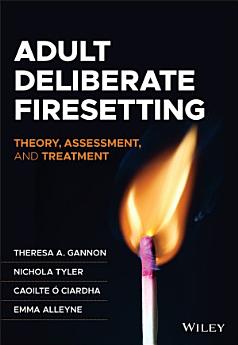Adult Deliberate Firesetting: Theory, Assessment, and Treatment
About this ebook
Explore the theoretical foundations of—and discover effective treatment options for—adults who deliberately set fires
In Adult Deliberate Firesetting: Theory, Assessment, and Treatment, a team of distinguished researchers deliver a comprehensive exploration of individuals who intentionally set fires. The book covers major theories on the motivations and processes involved in firesetting, as well as the assessment and treatment of patients and clients who demonstrate this behaviour.
The treatment portion of the book focuses on a strengths-based rehabilitative approach that rests on the assumption that criminogenic and human needs are inextricably intertwined. Readers will find common challenges faced by practitioners in recruiting and facilitating group-based treatment for people who have set fires.
Readers will also benefit from the inclusion of:
- A thorough introduction to deliberate firesetting, including its definitions, terms, and labels
- Comprehensive explorations of the key characteristics and clinical features of people who deliberately set fires
- Practical discussions of theories of deliberate firesetting, including effective psychological theory and typological explanations of firesettings
- In-depth examinations of best practice risk assessments in defendants, and patients who deliberately set fires
Perfect for psychology researchers and practitioners, Adult Deliberate Firesetting: Theory, Assessment, and Treatment will also earn a place in the libraries of psychiatrists, forensic psychologists, social workers, and others involved in the assessment and treatment of adults.
About the author
Theresa A. Gannon, DPhil, CPsychol (Forensic) is a Professer of Forensic Psychology and Director of the Centre for Research and Education in Forensic Psychology (CORE-FP) at the University of Kent, UK. Theresa also works as a Practitioner Consultant Forensic Psychologist specialising in deliberate firesetting for the Forensic and Specialist Service Line, Kent and Medway Social Care and Partnership Trust, UK. Theresa has published over 140 chapters, articles, books, and other scholarly works in the areas of male and female-perpetrated offending.
Nichola Tyler, PhD, is a Lecturer in Forensic Psychology at Victoria University of Wellington, New Zealand. Her research focuses on understanding the etiology and effective prevention of deliberate firesetting and sexual violence, and the impact of criminal justice work on legal professionals’ wellbeing. She has published over 30 book chapters, journal articles, and government reports on these topics.
Caoilte Ó Ciardha, PhD, is a Senior Lecturer in Forensic Psychology at the University of Kent, UK. He has published over 40 scholarly works and has held associate editor positions at three of the main journals in forensic psychology. His research focuses on psychological factors in the causes and the prevention of offending behaviour, especially sexual violence and firesetting.
Emma Alleyne, PhD, is a Reader in Forensic Psychology at the University of Kent, UK. She has published over 40 journal articles, book chapters, and government reports on the topics of gang-related violence, sexual offending, firesetting, and animal abuse. She currently leads a research programme that focuses on the offence-supportive attitudes associated with harming nonhuman animals (i.e., animal cruelty).





